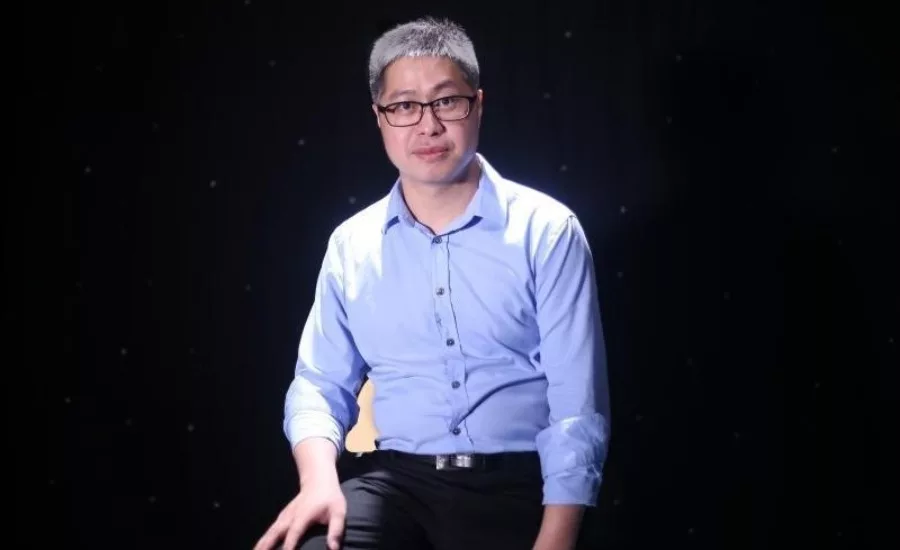Blockchain
How the founder of Ifoods is using blockchain for food safety
Founder Kallon talks about how children with beards led to his passion for food safety.

2012 was a turning point for Kallon, the founder of Ifood, a blockchain food safety solution.
At the time, Kallon had a number of titles, including a government relationship consultant for many global top 500 financial institutions, such as China's peace and ICBC, the Chinese Academy of Social Sciences Finance Institute, the Banker magazine, the Central University of Finance and Economics co-sponsored by the Chinese Financial Innovation Award for many years and has been in "silver". Connoisseur, director of new media department, and a good relationship with McKinsey, Boston consulting and KPMG.
The turning point came in July of that year when he participated in the national youth food safety knowledge competition as the executive secretary of the organizing committee.
"At that time, many children in primary schools actually grew beards," Kallon says. "This is not the healthy state of a group of primary school students during primary school. This phenomenon only illustrates the problem that children eat too much hormones."
It especially worried Kallon, who was set to become a dad soon. In a few years in the remote areas of Yunnan and Gansu, he saw a lack of local health education and from that moment on was determined to work food safety.
For the next two years, Kallon devoted himself to the health education of the young and young children, and he worked as a consultant for the Beijing Education logistics procurement platform and the executive director of the Chinese food traceability center. Under his organization, the National Children's food safety knowledge contest covered the whole country and called on the everyone to pay attention to children's food safety.
In the process, Kallon witnessed and participated in the efforts of practitioners on food safety issues and became more and more deeply aware that the problem of food safety and how difficult it was to control — the core pain point was the lack of credit system in the food field.
Looking for quick answers on food safety topics?
Try Ask FSM, our new smart AI search tool.
Ask FSM →
"For food enterprises, especially large food enterprises, they are the least willing to appear food safety problems, but the greater the enterprise, the procurement and logistics part of the more difficult to manage, many food enterprises have to face counterfeit products."
Then, in 2015, Kallon discovered blockchain in the food industry and was inspired.
Kallon's first introduction to blockchain technology trace came in 2013, when the central bank defined bitcoin as a specific virtual commodity. Over the next two years, he continued to pay attention to the development of bitcoin and became more and more excited about the gradual emergence of block chain technology.
Blockchain technology has the characteristics of consensus mechanism, distributed accounting, intelligent contract, not tampering, and time stamp. It had already caused a lot of discussion in the financial circle at that time. It also inspired Caron's Association to wonder if block chain technology could be introduced into the food field to help the food industry build a safe and transparent environment.
In 2015, by chance, Kallon talked to Dr. Lin Ruji, a leading figure in the field of food safety.
Lin Ruji is a PhD in food science at the University of Georgia in the United States. He was a senior manager of basic science, technical director and M & A, a consultant of national food safety and technology center of the United States, and honorary director of China Meat Research Institute, and President of new China food group, Canada, food (Beijing) Limited. He has a number of patents in the world for food technology, and has studied food research and development, production, traceability, technology optimization and artificial intelligence.
The two decided to try to use blockchain for food safety.
And, at the end of 2015, Kallon began to form a team to solve the last mile of food safety.
The project has been supported by the Ministry of industry and information, the National Bureau of Surveying and mapping, the China Telecom, the Heilongjiang Department of land and resources, and the China Education and television station.
From 2015 to 2017, they applied blockchain technology to various government poverty alleviation projects, combined with China Telecom National Agricultural cloud laboratory to push back poverty alleviation projects in beef cattle breeding in Qinghai Province, and implement the project of traceability and poverty alleviation by the Ministry of industry and information department.
In addition, the Academy of Sciences, China anticancer association, COFCO, the school of public health of the Peking University, the China blockchain research alliance, the district chain + agricultural laboratory, have been launched to accelerate the landing of blockchain technology in the food field.
In 2017, he proposed a more ambitious idea — creation of the Ifoods chain.
Everything was going well, but Kallon had even bigger plans.
The food field involves many aspects, from the supply of raw materials to food, the production of food, the circulation of food and the supply chain involved in the process of food, all kinds of food enterprises and hardware enterprises. After 2 years of blockchain entrepreneurship, Kallon discovered that simple traceability does not solve the problem of the entire food value chain.
How can we solve the pain problem of the whole food industry thoroughly and comprehensively? Kallon has decided to implement a more ambitious plan to be the maker of the global food blockchain standards and to provide a full solution for the food industry, which is Ifoods chain.
In September 2017, Kallon officially registered Ifoods chain. Caron's idea was to build a global food ecological environment with the help of Ifoods chain to provide solutions for food supply issues such as production, circulation, consumption and testing in the food industry.
The core goal of the platform includes three points:
- First, use blockchains to enhance global food productivity.
- Second, use the blockchain to improve food safety.
- Third, use "blockchain + intelligent hardware" to enhance consumers' intuitive and quick judgement of food quality.
To achieve this grand vision, the first step was to form a professional team spanning many fields such as food, blockchain, hardware, big data and so on. Kallon first thought of his old partner, Dr. Lin Ruji, who is now the chief scientist of Ifoods chain. In addition to Dr. Lin, he also invited top experts in the field of food, blockchain and intelligent hardware to participate in the Ifoodschain project, including:
Li Yanbo, a development consultant for blockchain who has studied cryptography at the Stanford University, and after years of working in the United States high Qualcomm.
Fan Zhikai, a master of Instrument Science and optoelectronic engineering of Beihang University, who has studied the global front nanoscale grating sensors, and has been responsible for the research and development of the Chinese food and drug management platform.
Li Yiling, a former overseas manager of Neo, who is a district chain community consultant. She has worked on the global marketing of termite, community building, business cooperation, and ecological construction, and dominates the list of the first one hundred of coinmarketcap and cooperates with FBG.
They also invited Feng Lishuang to be the chief hardware scientist. Lishuang was a researcher at the Beihang University, a doctoral supervisor and vice director of the micro measurement and control center. She was focused on the MEMS sensor research.
The Advisory Group also includes the professor of the school of public health of Peking University, Chai Weizhong, director of the China Institute of inspection and quarantine, the director of the South testing center of the China Institute of inspection and quarantine, the researcher Zhong Weike, the chief of the national sports administration of the State General Administration of sports, the God of the Olympic food and the Chinese food and beverage master Jia Kai, and others.
"These well-known experts in the field of food and blockchain technologies agree with the values of Ifoods chain," Kallon says. "Concerned about the healthy growth of the next generation, we hope to improve the global food safety with the help of blockchain technology. The common belief of values makes them willing to devote great enthusiasm to the construction of the Ifoods chain blockchain ecological platform, which has promoted the rapid development of the project. "
According to Caron, by March this year Ifoods chain development progress has exceeded 50 percent, and they have begun to conduct internal tests. It is expected to be officially launched in June this year and the first smart device super probe for C terminal will be released in October. In December, the company expects to on line the centralized distributed transaction community for B terminal and complete the core structure of the 1 main chain +2 applications.
Ifoods chain, a food ecological platform for the everyone
Kallon and his team believe that in order to make Ifoods chain a real solution to the whole food industry, each part of the value chain and the participants must be involved in the construction of the platform. As such, the Ifoods chain is open source, open food and area chain ecological platform in related fields, and features open platform ports to all value chain parties and provide technical support.
In order to allow food producers, processors, retailers, and consumers to easily participate in the blockchain ecology, the USP blockchain middleware system is designed on the basis of the bottom system of blockchain. The core architecture function and the service platform of various service systems are packaged for different use in the food industry.
The USP middleware system provides various ports for the actual application of the food industry and builds a bridge between the underlying technology and the upper application of the blockchain, thus reducing the application threshold of the blockchain technology. In this way, participants can easily input and obtain information through Ifoods chain.
"Even if it is a rookie, it can be used," Kallon says.
Now they are trying to build a super probe for Ifoods chain food inspection system. In October of this year, the first DAPP probe for beef detection will be launched. And, with the help of a portable smart terminal device, consumers can get data about beef in 2 minutes, including whether water was injected or not. According to the prediction of Ifoods chain, the super probe is expected to become the world's first blockchain DAPP application that day PV more than 10 million.
This will be a good thing for global users, and the future of the Ifoods chain ecological platform will help build a safe, transparent and credible environment for the beef industry and the whole food industry, which is equivalent to adding an "eye" for the food industry. It will provide food safety for hundreds of millions of people around the world.









